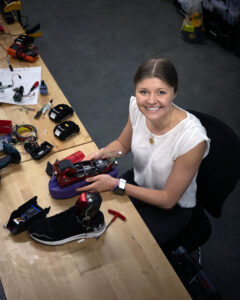 Mechanical engineering graduate student Karen Walker, student in the HGN Lab for Bionic Engineering, is a recipient of the National Science Foundation’s Graduate Research Fellowship Program (NSF GRFP). This prestigious fellowship supports outstanding doctoral and research-based master’s students doing research in science, technology, engineering and mathematics, or STEM, disciplines.
Mechanical engineering graduate student Karen Walker, student in the HGN Lab for Bionic Engineering, is a recipient of the National Science Foundation’s Graduate Research Fellowship Program (NSF GRFP). This prestigious fellowship supports outstanding doctoral and research-based master’s students doing research in science, technology, engineering and mathematics, or STEM, disciplines.
Established in 1952, the NSF GRFP is the oldest fellowship program of its kind. The 2025 fellows receive a three-year annual stipend of $37,000, a $16,000 cost of allowance for tuition and other costs, and numerous research and professional development opportunities.
This fellowship highlights the impressive work Walker is doing in investigating the impact of prosthetic devices on the biomechanics and mobility of individuals with lower-limb amputations. These devices provide powered assistance, which can enhance gait mechanics, increase efficiency, and improve overall comfort when walking.
“By studying real-world ambulation, my goal is to generate insights that drive the next generation of prosthetic design and ultimately improve the quality of life for users,” said Walker.
Walker had the opportunity to volunteer at a prosthetics and orthotics clinic during her undergraduate studies and saw firsthand how resilient people with mobility impairments can be. She also witnessed the powerful role that assistive devices can play in restoring independence and changing someone’s life, which motivated her to pursue research that helps others stay mobile and healthy.
“What excites me most about this research is the potential to make a real difference in the lives of people with amputations,” said Walker. “The work I’m doing could play a pivotal role in shifting the way we approach mobility for amputees, by showcasing the benefits of powered assistive devices. This is a step toward creating prosthetic devices that are not only functional but truly enable independence and enhance quality of life. It feels like we’re on the cutting edge of something that can have a big impact.”
Looking ahead, Walker will continue doing research that supports individuals with mobility impairments. Her goal is to help optimize devices that enhance mobility so users can walk more naturally, efficiently, and pain-free. This research will contribute to innovations that make assistive devices feel like a true extension of the body, bridging the gap between function and freedom, to play a role in expanding what’s possible in assistive technology.
“One thing I’ve learned is that impactful and translation research is a team effort,” said Walker. “I’m incredibly grateful to be part of the HGN lab, where every member of the team shares the same passion and purpose. It’s a collaborative environment, and I think that’s the key to driving progress in this field. I’m excited to continue learning and contributing to the field alongside such awesome individuals.”